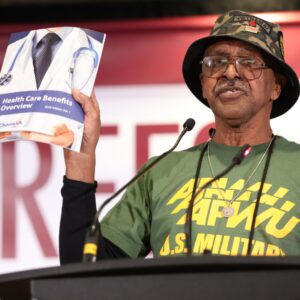November 12, 2021
Afghanistan Veteran Resources
(This article first appeared in the November/December issue of the American Postal Worker magazine)
Vantage Point an official website of the U.S. Department of Veterans Affairs has released a fourpart series focusing on Afghanistan Veterans and how they can get help through VA.
When the announcement came that U.S. forces would leave Afghanistan our nation’s longest war it triggered a complicated wave of emotions through those who served in the country. At its peak there were more than 100,000 U.S. troops in Afghanistan in 2010.
The Afghanistan Series encourages veterans to get help for posttraumatic stress disorder (PTSD) and contains the following parts:
- Afghanistan: How Veterans can reconcile service
- Afghanistan: How Veterans can learn from Vietnam Veterans
- Afghanistan: How spouses caregivers can support Veterans with PTSD
- Afghanistan: Resources available for PTSD
The first part of this series focuses on reconciliation.
Colón-López the highest ranking enlisted member in the military serves as an advisor to the Chairman of the Joint Chiefs of Staff on all matters involving joint and combined total force integration utilization health of the force and joint development for enlisted personnel. He revealed that he suffered for years dodging his PTSD and now encourages every veteran to get help for PTSD.
While some troops have reconciled their service not all have. With the recent news and announcements over the end of the Afghanistan mission VA facilities reported that they have started seeing an increase in veterans seeking help.
The second part of this series emphases how veterans who served in Afghanistan can learn from those who served in Vietnam. While the conflicts are different there are parallels between the two.
The third part of it is directed towards spouses and caregivers who are often on the front lines of helping a veteran deal with PTSD and which can seriously alter a family’s relationships.
While the entire series focuses on Afghanistan veterans PTSD options are available to all veterans. Veterans can get PTSD treatment at any VA medical center in the country and at some large Community Based Outpatient Clinics with nearly 200 specialized programs available.
Vet Centers
Vet Centers are community-based counseling centers. They provide a wide range of social and psychological services. Eligible veterans active service members – including National Guard and Reserve components – and their families can use the services.
Vet Center staff offer individual group marriage and family counseling in addition to referral and connection to other VA or community benefits and services.
The Vet Center Combat Call Center can be reached 24 hours a day seven days a week at 1-877-927-8387 (1-877-WAR-VETS).
Other Resources
The Veterans Crisis Line connects veterans in crisis and their families and friends with VA responders through a 24/7 hotline: 1-800-273- TALK (8255) PRESS 1. There is also a 24/7 online Confidential Veterans Chat or text message support at 838255.
The VA Caregiver Support program provides services to support family members who are taking care of a Veteran: 1-855-260-3274.
VA’s Coaching Into Care program helps family and friends of returning Veterans find the right words to help their loved one get into care. For free confidential coaching email or call: 1-888-823-7458.
The Psychological Health Resource Center offers 24/7 support for service members and their families. Staff can answer questions about mental health symptoms and help the service members and their families find resources. Call 1-866-966-1020 email or live chat.
Give an Hour is a nonprofit organization offering free mental health services to U.S. military personnel and their families affected by service in Iraq and Afghanistan.
Source: Department of Veterans Affairs (VA)


